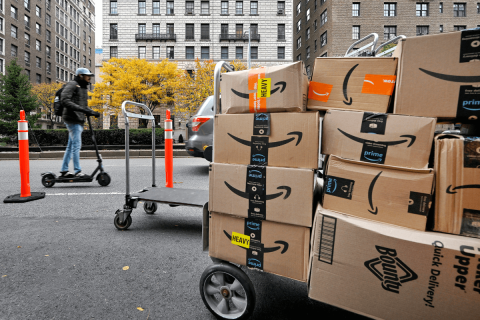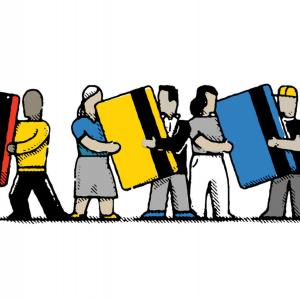
Sometimes we all need a reminder that the peace that passeth understanding doesn’t come with 2-day shipping.
As told to Sojourners.

“MY SHIFT ACTUALLY starts at 6:30 a.m., but I punch in at 6:25, get my coffee, and then we have a thing called ‘stand up’ where the managers talk about safety, what they expect for the day, and building announcements. They try to motivate people to pick faster. And then you’ll go to your station and you’ll start your job. In my case, it’s picking.
The screens display which item I need to pick out of a particular bin, and I’ll pick that item and put it in the yellow tote. Once the tote is full enough, I’ll set it down and replace it with another tote. That’s pretty much what I do for my whole 10-and-a-half-hour shift.
We get a 30-minute break at 10 a.m., after four and a half hours. Our next break is from 1:30 p.m. until 2. And then we work until 5 p.m. Yesterday I picked 1,300 items the first period. Second period I picked over 900 items.

TWO WEEKS BEFORE Christmas last year, I stood with 50 other national faith leaders on the banks of the Alabama River in Montgomery, Ala., trying to imagine what it must have been like to stand on that land in 1850, at the height of the black chattel slave trade.
We were embarking on a one-day pilgrimage convened by Sojourners and hosted by the Equal Justice Initiative (EJI). We were there to understand one thing: the nature of the confinement and control of black bodies in the U.S. from chattel slavery through Jim Crow to mass incarceration.
Congress banned the import of enslaved people in 1808, but it did not ban the slave industry. Slave traders turned inward. Men, women, and children of African descent were sold in the Upper South; chained together with shackles around their feet, wrists, waists, and necks; and marched—often without shoes—over hundreds of miles into the Deep South for sale to farm owners desperate to meet the explosive global demand for cotton after the invention of the cotton gin.

In the past, the bulk of my Christmas shopping has usually been done between 10 a.m. and 3 p.m. on Christmas Eve. There’s something about waking up on the day before Christmas in a sheer panic that propels me straight into the open arms of every electronics, sporting goods, and department store within a 10-mile radius. While my family spends the morning sipping coffee, making red velvet cake, and cutting intricate little gift tags, I’ve spent the day with folks I’ve come to recognize as my extended family—a dysfunctional, wild-eyed bunch with a procrastination problem.
This year, however, will be different. Last January my husband and I embarked on an adventure inspired by newspaper coverage of the Buy-Nothing-New Year covenant groups forming across the country. Together with a few friends from work, we agreed to spend an entire year living more simply by not buying anything new, with exceptions made for consumables (food, toilet paper, etc.), replacement parts such as water filters, and intangible services such as a night at the theater. We’ve found the best thrift stores, traded items with friends, and managed to give birth to our first child without ever stepping foot in a Babies “R” Us.
We moved together from bondage into mutuality.

CREDIT CARD DEBT plagues our communities. The average U.S. household carries a balance of $6,929 at the end of the month. And if you miss a payment, interest may jump from 15 percent to more than 20 percent.
Credit cards are part of a predatory industry with a history of racial bias. Many people can afford only the minimum monthly payment, barely making a dent in the principal —just as the system was designed.
About 10 years ago at Circle of Hope, my church in Philadelphia, we began experimenting with “credit card debt annihilation.” Our team’s motto came from Romans 13, where the apostle Paul urged believers to “owe no one anything,” except love.

I was in high school, visiting my grandparents’ church in Peru, Ind., and the theme for the Sunday school class was “money.” The teacher was quick to bring up a verse that has always sounded like it would be a better fit in Benjamin Franklin’s Poor Richard’s Almanack than the Bible. “The love of money is the root of all evil,” the teacher said, summarizing and abbreviating 1 Timothy 6:10. “It’s not that money itself is evil. Objects, in and of themselves, cannot be evil,” he explained. “It’s a matter of the heart.” That logic sat weirdly with me and so I raised my hand to respond. “Don’t we believe that idols are objects and that they are evil? Also, doesn’t the Bible teach us to resist temptation? So wouldn’t it make sense to resist the temptation of money to avoid all the evil that comes with it?”
